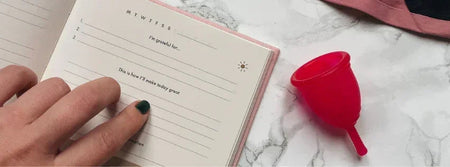For most of us, menstruation can be a frustrating inconvenience. But for some, it can be a clue to much more serious health problems. Almost all of us deal with fatigue, cramps and other minor issues during menstruation, but if you are dealing with extreme symptoms, it might be time to see your doctor.
Because of the stigma that surrounds menstruation in our culture, people often suffer in silence, believing that what they are dealing with is normal, rather than an indication that they need to see a physician.
Making sure people have the information that they need to take care of themselves is central to Ruby Cup’s mission, so we have compiled some information about what your period might be telling you—and what to do.
6 signs to look out for in your menstrual cycle that could indicate a health issue
1. Regularity
One important sign to be aware of in terms of your period is regularity—whether your period comes every month and around the same time. You may or may not have a cycle that is exactly thirty days long, says ARNP Libby Baldwin, but there should be some pattern.
If your period is coming once every 35 days, for example, that might just be that your body has a different schedule, but if it comes at unexpected times and not on a schedule at all, that might be an indication of medical issues. “Some variance there is totally fine, but some people have an irregular cycle, 30 days one month, 45 days the next month, 20 days the next, and that’s an irregular period. That’s something we would be happy to talk to people about, it can clue us into some other medical issues that might be going on,” she said.
How can you know if your period is regular? The easiest way is to track it on a calendar. There are apps that can track menstruation for you as well, such as this list from the Daily Dot. If you don’t have a regular period, schedule a time to chat with your doctor, as it can indicate conditions like Polycystic Ovarian Syndrome, among others.
2. Unusually Painful Cramps
Cramps are, unfortunately, part of the course for those of us who menstruate, but if your cramps are extreme and debilitating, talk to your doctor about getting help. Cramps should respond to standard over the counter pain medications—if they don’t, it could be a hint that you are dealing with a more serious issue like endometriosis, Baldwin explained. “If you’re not seeing significant improvement when you’re taking those medications, that’s something to come in and talk to us about,” she said.
For standard cramps, Baldwin suggests heating pads and hot showers and taking pain medication prior to the start of a period, which can block cramps from ever occurring. Sometimes, laying on your back on the floor and putting your feet on the wall can relieve period cramps. You can also try herbal teas or other natural remedies to ease the pain.
But if you’re in excruciating pain that denies you to keep up with your normal daily activities, you might be dealing with endometriosis.
Related post: Menstrual Cup Pain: Is It Normal & What Can You Do About It?
3. Persistent, Heavy Bleeding
What is a “normal” level of bleeding to have during menstruation? It varies widely between people. Some of us have light periods, and others tend to bleed more heavily. Having to change a tampon or pad hourly would be considered heavy bleeding or if you are bleeding more than 60-80 ml per cycle (at least that is how heavy periods are currently being defined.) If you’re using a menstrual cup and need to change it every 2-4 hours, then you’re probably dealing with a heavier flow.
Heavy periods are common and should be nothing to worry about, but if you are having several days of consistently heavy bleeding, make an appointment with your doctor. It could be another indicator for PCOS.
Though heavy periods may not always indicate a health issue, the constant changing of products is one of the reasons why heavy periods can be logistically and emotionally more difficult to manage. Menstrual cups offer a better solution because they hold 3x of what a tampon can hold. Also, have a look into some herbal teas that can reduce flow and keep an eye out on food to avoid that might increase your flow.
Related Post:
The 7 Best Menstrual Cups for Heavy Flow (No Leaks!)
4. Anemia or Intense Fatigue
Being a little bit tired during your menstrual cycle is nothing to worry about. In fact, you should absolutely grant your body some extra hours of sleep if it’s asking for it. But if you’re completely exhausted, you might be anemic during your cycle—low on iron. Incapacitating fatigue is worth chatting with your physician about, they might be able to prescribe some helpful supplements to keep your iron levels up, hence your energy levels more balanced.
5. Period-like cramping mid-cycle
If you are feeling cramps when you’re not bleeding or in the middle of your cycle, you should schedule an appointment with your doctor. That could indicate ovarian cysts, Baldwin explained. A doctor can help treat the issue and relieve your pain, but if you don’t get help, they could worsen, potentially leading to infertility if untreated.
Sometimes people spot in between periods; this is normally not a cause for concern. Some birth control methods can cause spotting, like the IUD or the pill. If spotting is a consistent issue for you, you can make an appointment see your doctor and check in.
Related post: Can You Use a Menstrual Cup with an IUD? Our Expert Guide
6. Not having your period
If you’re not getting your period at all, you should talk to your doctor. Sometimes people miss a period because of stress, but if you aren’t menstruating consistently, it can be a clue that something else is going on in your body. Missed periods are usually discussed as a sign of a possible pregnancy, but they can indicate other things are well.
For example, if people are significantly underweight, they usually stop menstruating. Being underweight can bring other health problems as well, so it is worth talking to your doctor.
A disrupted sleep cycle due to travel, nights out or studying can be problematic for your menstrual cycle too, as too many stress hormones block the hormones that are responsible for keeping your menstrual cycle regular.
Thyroid issues can also stop menstruation, according to Baldwin. Usually, once the issue is cleared up, menstruation should return to normal.
Know how to read your period signs and don’t be afraid to address them
First of all, it’s important that you find a doctor you can trust and who listens to you. Recent articles have been revealing how often menstruation-related pain is being brushed away and signed off as something that “you just have to deal with”. You don’t.
There has been a wave of voices sharing similiar experiences of suffering due to a doctor not giving their pain the attention it deserves. If your doctor does not take your pain seriously, find a new one. Make sure that doctor is one that you feel comfortable with and answers all your questions. Everyone deserves to be healthy, and getting information is the first step.
So if you do see your doctor because of one of the issues on this list, what might they suggest? Of course, it will vary by physician and by patient, but there are treatments for conditions like PCOS and endometriosis. For example, putting people on birth control pills can work as a treatment for these issues. Sometimes doctors will also prescribe other hormone suppression medications.
There are a variety of options, and there is no reason for anyone to suffer in silence. Menstruation is one way that our bodies send us messages about what is going on with them, and if we don’t listen to those messages, there could be more serious consequences.
And always remember: if your period is interfering with your everyday life, such as making you incapable of going to school or to your job, we’re talking about a health issue and your doctor has to take your suffering seriously.
Don’t be afraid to address any abnormalities within your menstrual cycle – your body will thank you.










